
Piece of advice for you – never buy a huge amount of champagne unless you’re absolutely certain it’s worth celebrating.
In November 2016, Russian ultranationalist politician Vladimir Zhirinovsky was so excited by Donald Trump’s victory, and so sure that it would transform US-Russian relations, he splashed out on 132 bottles of bubbly down at the Duma, Russia’s parliament, and partied away (in his party offices) in front of the TV cameras.
He wasn’t the only one celebrating.
The day after Trump’s surprise White House win, Margarita Simonyan, editor-in-chief of state channel RT, tweeted her intention to drive around Moscow with an American flag in her car window.
And I’ll never forget the moment a Russian official told me she had smoked a cigar and drunk a bottle of champagne (yes, MORE champagne) to toast Trump winning.

In Moscow, expectations were high that Trump would scrap sanctions against Russia; perhaps, even, recognise the Crimean Peninsula, annexed from Ukraine, as part of Russia.
“The value of Trump was that he never preached on human rights in Russia,” explains Konstantin Remchukov, the owner and editor-in-chief of newspaper Nezavisimaya Gazeta.
It didn’t take long for all that fizz to go flat.
“Trump introduced the heaviest sanctions against Russia at that time,” recalls Remchukov.
“By the end of his term, a lot of people were disappointed in his presidency.”
Which is why, eight years on – publicly at least – Russian officials are more cautious about the prospect of a second Trump term.
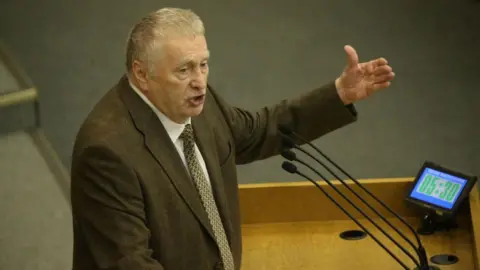
President Vladimir Putin has even come out and backed the Democratic Party candidate, although that “endorsement” was widely interpreted as a Kremlin joke (or Kremlin trolling).
Putin claimed he liked Kamala Harris’s “infectious” laugh.
But you don’t need to be a seasoned political pundit to understand that out on the campaign trail it’s what Trump has been saying, not Harris, that’s guaranteed to put a smile on Putin’s face.
For instance, Trump’s criticism of the scale of US military assistance for Ukraine, his apparent reluctance to blame Putin for Russia’s full-scale invasion and, during the presidential debate, his refusal to say whether he wants Ukraine to win the war.
By contrast, Kamala Harris has argued that support for Ukraine is in America’s “strategic interest” and she has referred to Putin as “a murderous dictator”.
Not that Russian state TV has been particularly complimentary about her either. A few weeks ago one of Russia’s most acerbic news anchors was completely dismissive of Harris’s political abilities. He suggested she would be better off hosting a TV cookery show.

There’s another possible outcome that may well suit the Kremlin – a super tight election, followed by a contested result. An America consumed by post-election chaos, confusion and confrontation would have less time to focus on foreign affairs, including the war in Ukraine.
US-Russian relations soured under Barack Obama, grew worse under Donald Trump and, in the words of the recently departed Russian ambassador to Washington Anatoly Antonov, they are “falling apart” under Joe Biden.
Washington lays the blame fully on Moscow.
It was just eight months after Putin and Biden met for a summit in Geneva that the Kremlin leader ordered the full-scale Russian invasion of Ukraine.
Not only did the Biden administration send a tsunami of sanctions Russia’s way, but US military aid has been crucial in helping Kyiv survive more than two-and-a-half years of Russia’s war. Amongst the advanced weaponry America has supplied Ukraine are Abrams tanks and HIMARS rocket systems.
It’s hard to believe now that there was a time, not so long ago, when Russia and the US pledged to work as partners to strengthen global security.
In the late 1980s Ronald Reagan and Mikhail Gorbachev formed a geo-political double-act to slash their countries’ respective nuclear arsenals.
If there was one thing Reagan seemed to enjoy as much as nuclear disarmament it was reciting Russian proverbs to Gorbachev in broken Russian (“Never buy 132 bottles of champagne unless you’re certain it’s worth celebrating” would have been a good one).
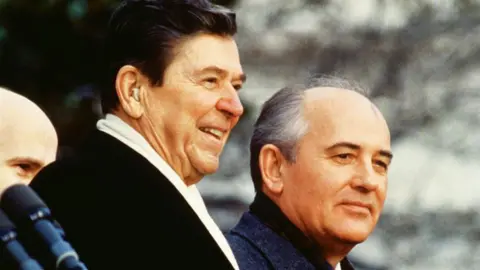 Getty Images
Getty ImagesIn 1991 the First Ladies of the USSR and America, Raisa Gorbacheva and Barbara Bush, unveiled an unusual monument in Moscow – a mother duck with eight ducklings.
It was a replica of a sculpture in Boston Public Gardens and was presented to Moscow as a symbol of friendship between Soviet and American children.
It’s still popular with Muscovites today. Russians flock to Novodevichy Park to pose for photos with the bronze birds, although few visitors know the back story of superpower “duck diplomacy”.
Like US-Russian relations themselves, the ducks have taken a few knocks. On one occasion some of them were stolen and had to be replaced.
It’s to the Moscow mallard and her ducklings I head to find out what Russians think of America and of the US election.
“I want America to disappear,” says angry angler Igor who’s fishing in a nearby pond. “It has started so many wars in the world. The US was our enemy in Soviet times and it still is. It doesn’t matter who’s president.”
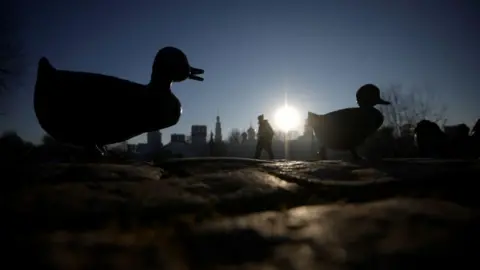 Getty Images
Getty ImagesAmerica as Russia’s eternal enemy – that’s a worldview often reflected here in the state media. Is Igor so angry because he gets his news from Russian TV? Or perhaps it’s because he hasn’t caught many fish.
Most of the people I chat to here do not see America as an evil adversary.
“I’m all for peace and friendship,” says Svetlana. “But my friend in America is scared to call me now. Maybe there’s no free speech there. Or, perhaps, it’s here in Russia that there’s no freedom of speech. I don’t know.”

“Our countries and our two peoples should be friends,” says Nikita, “without wars and without competing to see who has more missiles. I prefer Trump. When he was president there weren’t any big wars.”
Despite the differences between Russia and America there is one thing the two countries have in common – they have always had male presidents.
Can Russians ever see that changing?
“I think it would be great if a woman became president,” says Marina.
“I would be happy to vote for a woman president here [in Russia]. I’m not saying it would be better or worse. But it would be different.”
North America correspondent Anthony Zurcher makes sense of the race for the White House in his twice weekly US Election Unspun newsletter.
Harris makes last big-stage pitch to undecided voters, vowing ‘different path’
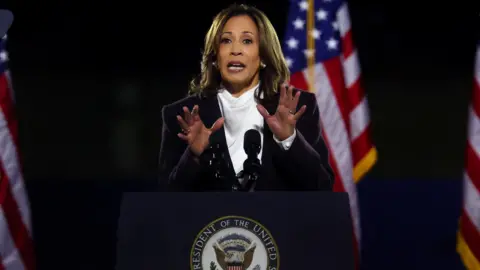
The night before Kamala Harris sets off on a final multi-day swing through the key battleground states that will decide the 2024 presidential election, she gave one last speech, practically in the shadow of the White House.
The venue choice was no accident. Donald Trump held his rally on 6 January 2021 in the same place, speaking to supporters just hours before thousands of them stormed the Capitol and disrupted certification of Joe Biden’s presidential victory.
On a mild October night, Harris stood before what her campaign estimated was 70,000 cheering supporters at an event they may hope is a counterpoint to that cold, violent January day.
And in the unlikely chance the symbolism was missed by anyone watching, Harris made it explicit early in her speech.
“We know who Donald Trump is,” she said on Tuesday. “He is the person who stood at this very spot nearly four years ago and sent an armed mob to the United States Capitol to overturn the will of the people in a free and fair election.”
Harris didn’t dwell on the 6 January riot, however. The venue did most of the heavy lifting, providing the subtext to the speech and the point from which Harris could pivot.
While she opened by darkly warning of an “unstable” and “unhinged” Trump “obsessed with revenge”, she turned to focus on what she called her “different path”.
Acknowledging that many undecided American voters “are still getting to know” her after her abbreviated presidential campaign, Harris touched on the highlights of her biography and upbringing.
She went on to hit some of her top policy proposals, including lowering the cost of housing, expanding the child tax credit and adding homecare coverage to government-provided health insurance for the elderly.
She spent even more time talking about abortion and the need to enact legislation that provides national abortion rights – a particularly strong area for Democrats over Republican opponents.
It was, in effect, a trimmed-down version of her Democratic National Convention address – a bookend to the late August speech that the campaign billed as an introduction to Americans.
Democrats were riding high back then, enthusiastic about their new nominee after weeks of despondency and infighting that led to Biden’s decision to abandon his re-election bid.
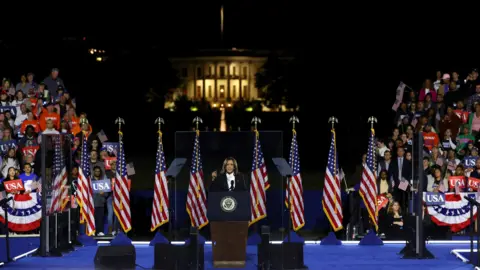
Since then, Harris’s campaign has had ups and downs, and is now locked in what is shaping up to be a photo finish next week.
If the polls are accurate, Harris still has work to be done to win over undecided Americans – and this speech was her last, biggest effort to do so on a prominent stage, with the White House looming over her shoulder.
Setting aside her biographical highlights and policy details, the message her campaign seems to want voters to have in mind on election day is one of contrasts – of division versus unity; bitterness versus hope; partisanship versus co-operation; past versus future.
“I pledge to seek common ground and common sense solutions to make your lives better,” Harris said. “I am not looking to score political points. I am looking to make progress.”
As she was delivering her speech, however, the current resident of the building behind her made comments that illustrated how difficult her task might be.
Biden, speaking of a derisive joke about Puerto Rico that a comedian made at a Trump rally on Sunday, appeared to refer to Trump supporters as “garbage”.
The president later claimed he was referring only to the comments made by the rally speaker. But the video of his remarks are unclear – and the episode was already distracting from Harris’ event on Tuesday evening.
It’s just one more obstacle Harris will have to overcome, along with assuaging Americans’ concerns about the economy and immigration – where polls indicate Trump has the advantage.
She tried to address those in her speech as well, even if they seemed to take a back seat to more lofty language and pointed attacks.
Her speech framed the election in a way that is to her advantage. Next Tuesday will reveal whether a majority of the American public – or at least a plurality in enough key battleground states – agrees.
North America correspondent Anthony Zurcher makes sense of the race for the White House in his twice weekly US Election Unspun newsletter.
Harris or Trump? What Chinese people want from US election
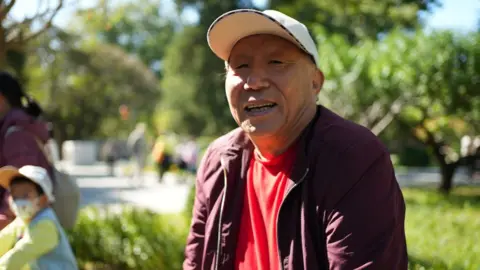
In China, people are following the US election with keen interest and some anxiety. They fear what could happen next at home and abroad, whoever wins the White House.
“None of us wants to see a war,” says Mr Xiang, as the music in the park reaches a crescendo and a nearby dancer elegantly spins his partner.
He has come to Ritan Park to learn dance with other seniors.
They gather here regularly, just a few hundred metres from the Beijing home of the American ambassador in China.
In addition to new dance moves, the looming US election is also on their minds.

It comes at a pivotal time between the two superpowers, with tensions over Taiwan, trade and international affairs running high.
“I am worried that Sino-US relations are getting tense,” says Mr Xiang who’s in his 60s. “Peace is what we want,” he adds.
A crowd has gathered to listen to this conversation. Most are reluctant to give their full names in a country where it is permissible to talk about the US president, but being critical of their own leader could get them in trouble.
They say they are worried about war – not just about a conflict between Washington and Beijing but an escalation of current wars in the Middle East and Ukraine.
That is why Mr Meng, in his 70s, hopes Donald Trump will win the election.
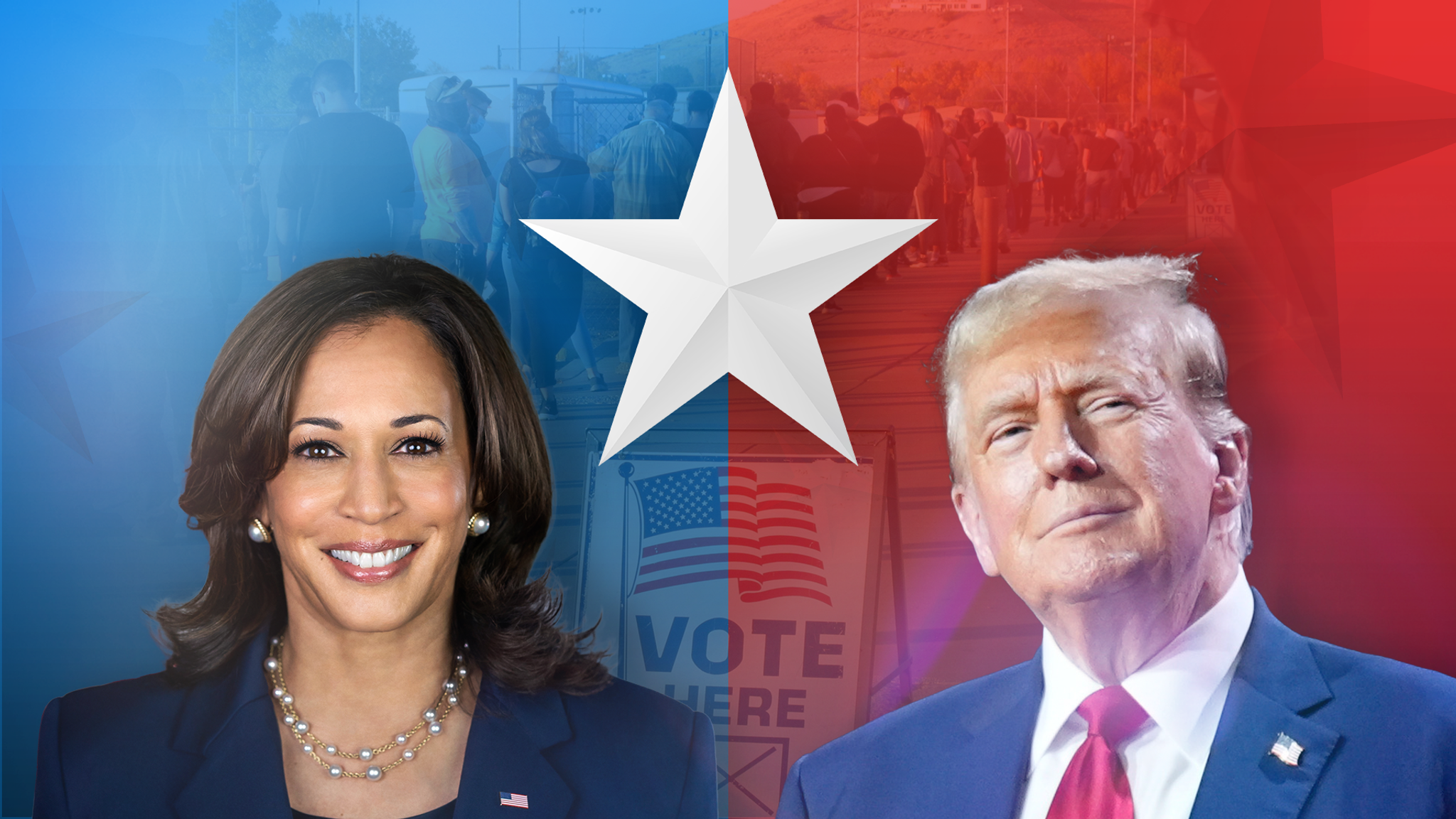
“Although he imposes economic sanctions on China, he does not wish to start or fight a war. Mr Biden starts more wars so more ordinary people dislike him. It is Mr Biden who supports Ukraine’s war and both Russia and Ukraine suffer great loss from the war,” he said.
Some sisters recording a dance routine for their social media page chip in. “Donald Trump said in the debate that he will end the war in Ukraine 24 hours after he takes office,” says one.
“About Harris, I know little about her, we think she follows the same route as President Biden who supports war.”
Their opinions echo a key message being propagated on Chinese state media.
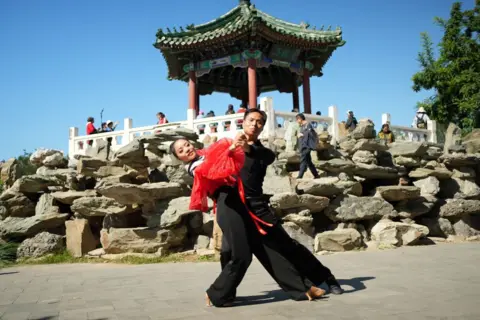
China has called on the international community to negotiate a ceasefire in Gaza while aligning itself with what it describes as its “Arab brothers” in the Middle East and has been quick to blame the US for its unwavering support of Israel.
On Ukraine, Foreign Minister Wang Yi told the United Nations that China was playing a “constructive role” as he accused Washington of “exploiting the situation for selfish gain”.
While most analysts believe Beijing does not have a favourite in this race for the White House, many would agree that Kamala Harris is an unknown quantity to Chinese people and the country’s leaders.
But some believe she will be more stable than Trump when it comes to one of the biggest flashpoints between the US and China – Taiwan.
“I don’t like Trump. I don’t think there is a good future between the US and China – there are too many problems, the global economy, and also the Taiwan problem,” says a father of a four-year-old boy in the park for a family day out.
He fears their differences over Taiwan could eventually lead to conflict.
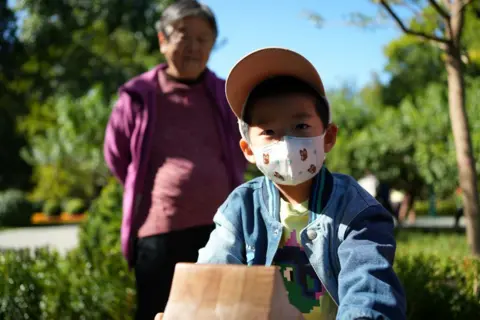
“I don’t want it. I don’t want my son to go to the military,” he says as the young boy pleads to go back on the slide.
China claims the self-governing island of Taiwan as its own and President Xi Jinping has said “reunification is inevitable”, vowing to retake it by force if necessary.
The US maintains official ties with Beijing and recognises it as the only Chinese government under its “One China policy” but it also remains Taiwan’s most significant international supporter.
Washington is bound by law to provide Taiwan with defensive weapons and Joe Biden has said that the US would defend Taiwan militarily, breaking with a stance known as strategic ambiguity.
Harris has not gone that far. Instead, when asked in a recent interview she stated a “commitment to security and prosperity for all nations”.
Donald Trump is instead focused on a deal – not diplomacy. He has called on Taiwan to pay for its protection.
“Taiwan took our chip business from us. I mean, how stupid are we? They’re immensely wealthy,” he said in a recent interview. “Taiwan should pay us for defence.”
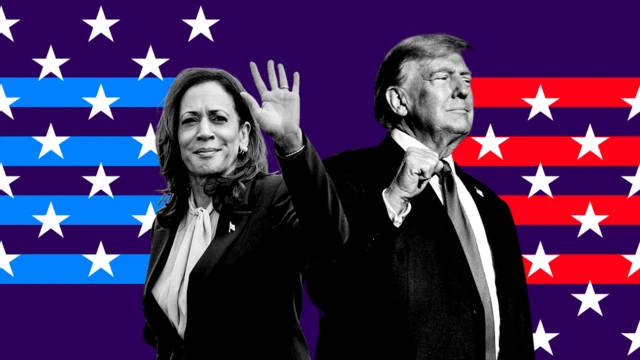
One of their biggest worries when it comes to the former US president is that he has also made it clear he plans to impose 60% tariffs on Chinese goods.
This is the last thing many businesses in China want right now as the country is trying to manufacture enough goods to export itself out of an economic downturn.
Ministers in China bristle with contempt at US-led trade tariffs which were first imposed by Donald Trump.
President Biden has also levied tariffs, targeting Chinese electric vehicles and solar panels. Beijing believes these moves are an attempt to curb its rise as a global economic power.
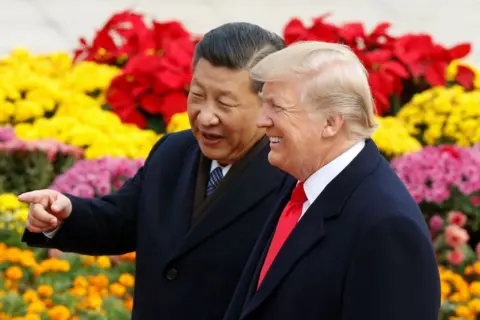 Getty Images
Getty Images“I don’t think it will do any good to the US to impose tariffs on China,” says Mr Xiang, echoing the sentiments of many we met. The tariffs will hit the US people, he adds, and increase costs for ordinary people.
Many of the younger generation, while patriotic, also look towards the US for trends and culture – and that, perhaps more than any diplomatic mission, has power, too.
In the park, Lily and Anna, aged 20 and 22, who get their news from TikTok, echo some of the national messages of pride spread by Chinese state media when it comes to this competitive relationship.
“Our country is a very prosperous and powerful country,” they say, dressed in their national costumes. They love China, they said, although they also adore the Avengers and particularly Captain America.
Taylor Swift is on their playlists, too.
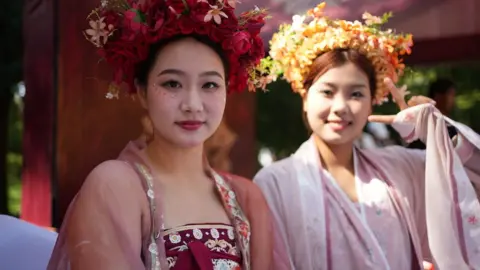
Others like 17-year-old Lucy hope to study in America one day.
As she cycles on an exercise bike, newly installed in the park, she dreams about visiting Universal Studios one day – after her graduation.
Lucy says she is excited to see there is a female candidate. “Harris’s candidacy marks an important step forward for gender equality, and it’s encouraging to see her as a presidential candidate.”
The People’s Republic of China has never had a female leader and not a single woman currently sits on the 24-member team known as the Politburo that comprises most senior members of the Chinese Communist Party.
Lucy is also worried about the intense competition between the two countries and believes the best way for China and the United States to improve their relationship is to have more people-to-people exchanges.
Both sides have vowed to work towards this, and yet the number of US students studying in China has fallen from around 15,000 in 2011 to 800.

Xi hopes to open the door for 50,000 American students to come to China in the next five years. But in a recent interview with the BBC, the US ambassador to China, Nicholas Burns, accused parts of the Chinese government of not taking this pledge seriously.
He said that, on dozens of occasions, security forces or a government ministry had prevented Chinese citizens from participating in public diplomacy run by the US.
On the other side, Chinese students and academics have reported being unfairly targeted by US border officials.
Lucy, however, remains optimistic that she will be able to travel to America one day, to promote Chinese culture. And, as the music strikes up nearby, she urges Americans to visit and experience China.
“We may be a little bit reserved sometimes and not as outgoing or as extrovert as US people, but we are welcoming,” she says as she heads off to join her family.







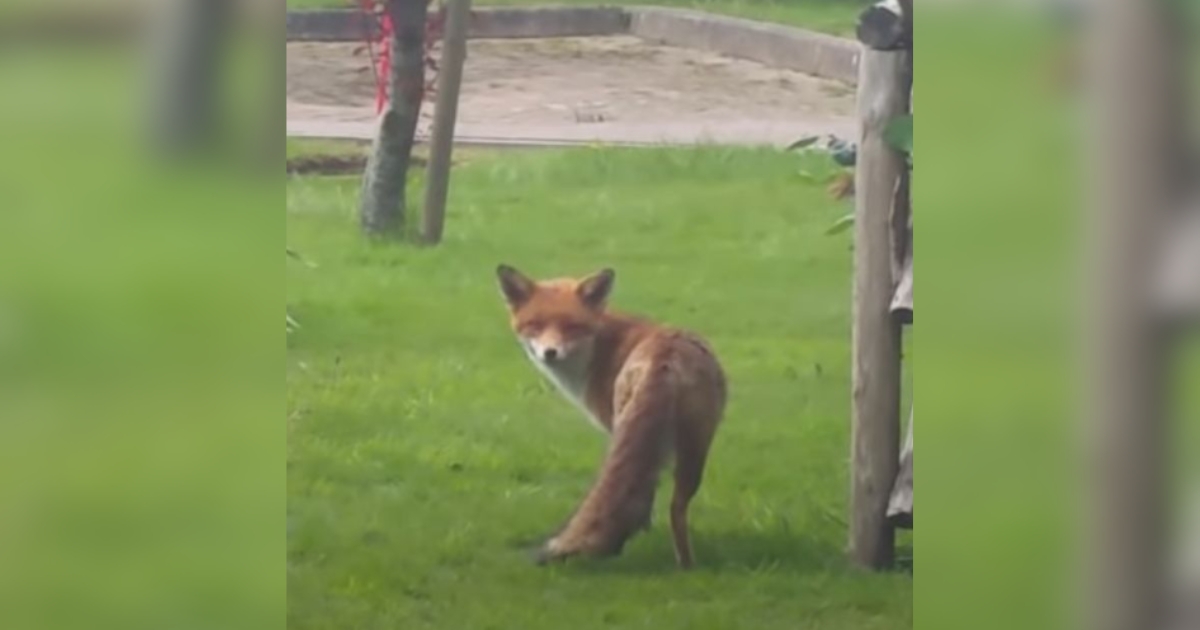









:max_bytes(150000):strip_icc():focal(999x0:1001x2)/no-time-to-die-1-2000-0892ec328cf04d98abd4c7cf18483821.jpg?w=1200&resize=1200,0&ssl=1)













:max_bytes(150000):strip_icc():focal(999x0:1001x2)/catherine-ohara-013026-7-4b5b413a646d4f15a1fd15ac8b933811.jpg?w=1200&resize=1200,0&ssl=1)








